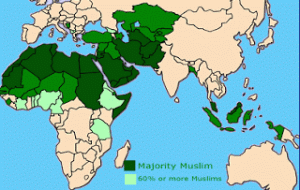As Muslims around the world celebrate the Hijri New Year, everyone is focused on remembering and telling the story of Prophet Muhammad’s migration from Makkah to Madinah and the hardships he had to endure in the preparations and on the way. Everyone memorizes the beautiful song the Ansar greeted him with, and every Muslim longs to visit Madinah for its special place in the Prophet’s heart.
Within a modern setting where we have cars, planes and internet, a trip in the desert on camel-back to reach a distant oasis with sword-wielding infidel thugs in pursuit becomes more of a folktale than a true-life experience rich with lessons we could all learn and practice until the end of time, no matter how modern or educated we are.
Very few of us realize that Hijrah did not end as soon as Prophet Muhammad (peace be upon him) reached Madinah safely and was welcomed with the famous song. Most Muslims are not aware that Hijrah actually extends until our present day so each one of us could enjoy some of its benefits.
True, the first immigrants (Muhajeroun) at the time of the Prophet have a special privilege over the rest of us, but let’s also remind ourselves that this door of mercy was not totally closed to the rest of the nation after them. Prophet Muhammad (peace be upon him) said:
“A Muslim is someone who spares people the harm of his tongue and his hand, and a migrant is someone who migrates away from what God has forbidden”. (Al-Bukhari, 6484)
This amazing statement actually gives us great hope that we too could be eligible for some of the rewards of “muhajeroun”, here is how:
The simple meaning of the word Hijrah (migration) is to move from one place to the other and take up residence there. Today, people immigrate to other countries to make a better living: find better jobs, education, or marriage opportunities, yet, by Islamic standards, the scope is much wider.
The reasons behind the move have to comply with Islam. Seeking a better living for self and family is indeed a great cause and it is actually encouraged in Islam, but it becomes greater if one leaves a place where he is restricted in practicing Islam or pressured into destructive beliefs and habits, and migrates to a new place where he and his loved ones could enjoy more freedom to practice Islam in a more supportive environment.
In parallel, another dimension of Hijrah happens discreetly in the heart, and eventually reflects on one’s behavior and relationship with the rest of the world. This is the type of Hijrah mentioned in the Prophet’s statement: migrating “away from what God has forbidden” not just physically by moving to a new place, but also spiritually and ethically, by choosing good over evil and ethics over corruption, and pledging to withstand the tribulations of struggling to stay on that path for life.
This implies being knowledgeable and mindful of God’s commands and prohibitions in the Quran and Sunnah, being strong enough to control one’s urges, being aware of the world around us, and seeking to rise in rank in the sight of God by constantly working to be a better person and a better Muslim. Obviously this is something we could all do every day, and it’s not a coincidence that the Prophet mentioned good manners –sparing people the harm of tongue and hand- in conjunction with Hijrah in this hadith.



